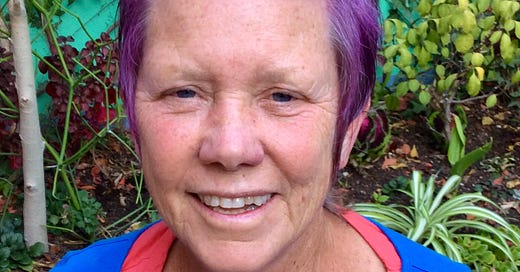Lessons from 45 years of freelancing
Mistakes, wisdom, and tips from a veteran freelance writer
I looked out at the standing-room-only crowd. Unexpectedly, more than 200 women had showed up for my speech, based on the 1978 book Fat is a Feminist Issue. When a reporter from The Seattle Times asked me for an interview, I realized I was on the cusp of a new business. Indeed, that presentation helped me start not one but two businesses: that of freelance writer and weight loss consultant.
Before my talk, I had been freelancing for about a year, writing on fitness and travel, but it was only after my presentation, recognizing I had an obvious market, that I began to write about weight loss, body image and related topics. Within a few months I was writing for Glamour, McCall’s, Modern Bride, and other national magazines. I’ll never forget sitting at the kitchen table, speechless, when Glamour’s Managing Editor offered me $750.
Over the last 45 years, while I’ve made mistakes as a freelancer, I’ve also enjoyed plenty of successes. Here are my recommendations based on what I did and didn’t do.
What I’ve Learned Over 45 Years of Freelance Writing
1. Never miss an opportunity. I gave the talk because the community college in Seattle, where I was teaching English as a Second Language, housed a Women’s Center, and in between my classes, I’d chat with the coordinator. One day, when she told me she was planning a lunchtime speaker series, I saw an opportunity and grabbed it.
2. Find an overlap between personal interests and market need. I was deeply engaged by the theme of weight loss because after years of struggling with my weight, I had finally lost 20 pounds by listening to my body, one of the principles of the book. After my presentation, in addition to writing articles, I began leading weight loss support groups through the University of Washington..
This parallel track of freelance writing and consulting became a successful pattern I used throughout my working life. The balance also helped because my personality isn’t suited to writing exclusively. I’m an extrovert and need to engage with people.
3. Tweak article topics for different markets. I sold my article, “Self-Esteem: The Best Diet Pill There is,” to Weight Watchers Magazine; then as a reprint to the UK version of WWM, as well as to a South African women’s magazine called Fair Lady. Later I sold slightly different versions to Catholic and teenage magazines. And Norman Vincent Peale even bought it to make it available to his congregation! (I’m not Catholic, but religious publications often seek articles on health). In the years that followed, I sold reworked articles and reprints to different magazines in the U.S., as well as Canada, Australia, and Brazil.
Following my example, I suggest defining a deep interest, then shape-shifting it into different forms (e.g., article, reslanted article, newsletter, webcam, podcast, Ted Talk, workshop, speech, ongoing group, coaching session). Apply your idea locally, nationally, and internationally.
4. Use all existing media to promote yourself. A few years after establishing my business, a client invited me to lead a seminar for her staff. After I led the workshop, I gradually transitioned into business training. Throughout these changes, I kept writing articles.
Around this time, my husband and I moved from Bellingham to Palo Alto, CA. While I marketed my training business, I leaned on the pay I received from writing articles on a myriad of self-help topics, not just weight loss. In fact, an article I wrote for Entrepreneur on how to improve your presentation skills landed me my first gig in Silicon Valley. I sent my resume and a copy of the article to LinguaTec, a company that trained foreign professionals on how to address U.S. audiences. Based on the article, and my former career as an ESL instructor, I immediately became their niche trainer on public speaking, a role which provided me a valuable gateway into many high-tech companies.
Similarly, I wrote about women’s communication skills for a magazine that no longer exists, New Woman, for which I was paid a now-rare $1,000. A Hewlett-Packard employee read the article and hired me to lead in-house seminars, which ultimately led to my giving international seminars for HP in India and Israel.
Eventually I began offering my seminar, “More Power To You: Communication Skills for Women,” to community colleges throughout the Bay Area. Wherever I taught, I’d contact the local newspaper and invite a reporter to interview me. A columnist at the Santa Rosa Press-Democrat published an article about me, which was syndicated in the Knight-Ridder newspaper chain, including The Chicago Tribune and The Phoenix Republic. The media coverage landed me my first of many out-of-state gigs.
Even with today’s slimmer newspapers, you can still contact your local paper and other media for publicity. For example, after my husband published a book on science, he gave interviews from our home to radio stations around the country.
5. Find your people. In Palo Alto, I joined Monday Writers, a group of highly talented cross-genre writers. At first I was skeptical, thinking I had nothing to learn from prose and poetry writers. Wrong! The critiquing I received was the best I’ve ever known. Plus, I found a home in the large, anonymous Bay Area.
You too could probably benefit from a support group, because isolation can overwhelm you and sap your energy. Consider taking a writing class at a local community college, which is how my writers’ group evolved. Other groups I’ve known started as book clubs.
6. Take advantage of mentors. I also joined NSA (National Speakers Association), where I met colleagues with far more experience than me. Unfortunately, sometimes I wanted to leave the impression that I already knew what I was doing rather than betray my ignorance. What a mistake that was, valuing ego over education! A friend who joined at the same time asked many more questions of mentors than I did–and became far more successful. Follow her example, not mine.
As writers, we’re often in the role of expert, but to grow, we have to embrace the unknown and be curious. Because I enjoy interviewing people, I’ve written about areas which I knew nothing about, such as local history and botany.
7. Embrace the abundance mindset. I was very jealous when a college acquaintance became a best-selling author on the subject of compulsive eating. It took a long time, but I gradually learned to be happy when other people excelled, which I believe is crucial to our own success. There are plenty of opportunities to go around.
8. Consider supplementing your writing with speaking. Speaking and training tend to pay more than writing, so it’s smart to consider both, as do many of my colleagues. After developing an expertise, they give speeches or write a book–and pretty soon they’re doing both. I also recommend joining Toastmasters, a speech club that not only helped launch my speaking business but that of many others.
9. Focus on enthusiasm over confidence. If you feel anxious about speaking in public, I suggest rather than worrying about developing confidence, focus on your innate enthusiasm for your topic. Dig deep to remember what inspired you to write, and speak from that place. Your enthusiasm will motivate you to face your fears, take risks, and rebound from rejection much more than fickle confidence ever will.
10. If money is your goal, specialize; If variety is, generalize. In both the writing and speaking fields, I’ve often been encouraged to specialize, because the more defined your niche, the more easily identifiable and successful you are. I like to write on a variety of topics, from expat life and travel, to physical, psychological, and spiritual health. Money is not my only goal, and it may not be yours. Get clear on what your priority is.
11. “Personal leads to profitable.” I heard this motto early in my career, and it’s proven true for me. Developing warm relationships with editors has led to success. The closer and more trusting the relationship, the more the repeat business. For example, I've known an Australian editor since the 80s. Not once have we met, but she has assigned me many articles over the years.
Whatever niche of writing you enjoy, technology and industry will always be changing. But the timeless strategies I stumbled on more than 40 years ago still apply today: figure out what you love, do it with gusto, and spread the word.
Louisa Rogers is a writer and speaker whose topics include travel, expat life, wellness, food and spirituality. Her articles and essays have been published in six countries. She offers workshops and coaching on pitching, marketing, writing and speaking. Louisa presents regularly at the annual San Miguel (Mexico) Writers Conference. You can check out her articles here and contact her at louisarogers51@gmail.com.






